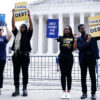It is high time the United States and Europe confronted Iran about its history of human rights abuses committed against its own people. Iran is a problem for the world on so many levels: as a nightmare nuclear power, as a sponsor of international terrorism, a nuclear proliferator and a threat to regional stability in the Middle East. But what has often been missing in the international hand-wringing sessions vis-à-vis Iran is the toll the Tehran regime is taking on its own people. Stating that we will deal with whoever is in power is simply not good enough when it comes to certain kinds of regimes. It leaves the Iranian people with the impression that we simple don’t care – and just as bad, it leaves the regime with the feeling that it can act with impunity against its own population.
In that context, it is important that Washington and the EU have finally pushed the issue of Iran’s human rights record to come up before the U.N. Human Rights Council. On Tuesday, Iran was denounced in Geneva for its bloody crackdowns following the peaceful protests that followed the contested Iranian election on June 12, one year ago Saturday. The accusations were leveled as the U.N. Security Council voted to impose additional – though not very stringent – new sanctions on Iran.
It is high time, the world focused on what is going on inside Iran. According to Iranian Radio Free Europe journalist Glonaz Esfandiari, speaking at the Heritage Foundation on June 9th, “Iran today is a prison.”
The human rights situation, which was bad before last year’s stolen presidential election, has become even more dire, and Iranian dissidents and human rights activists are fleeing the country for fear of the brutal treatment they receive at the hands of interrogators, who use torture and rape as common techniques. The political opposition, the Green Movement, has gone underground, though as Esfandiari made very clear, the Green Movement has not disappeared. In fact, she said, the harsher the repression, the stronger the determination among the opposition in the drive for political freedom.
In Geneva, U.S. Ambassador Eileen Chamberlain Donahoe stated that the situation in Iran was one of “grave concern.” Since last June, by the U.S. government’s count, some 250 people have been arrested, prosecuted and convicted for participating in post-election protests. Fifty among them are still serving terms. According to Amnesty International, the number people arrested in Iran since the June election is closer of 5,000.
By the U.S. government’s count at least 35 journalists are currently imprisoned in Iran because of their efforts to report on political activity since the election. This will add to Iran’s status as the country with the most journalists in jail, beating out Cuban and North Korea. Iranian authorities block Internet sites of human rights groups and independent media. Indeed, Iran since last June has created the Iranian Cyber Army (ICA) whose purpose it is to patrol the Internet looking for dissent and human rights activity. Human rights defenders are routinely targeted by the Iranian authorities.
In Geneva, the Iranian reprehensive did not respond directly to these serious charges, but instead attacked the EU the United States.
The Iranian people today live under a regime of terror, which will continue until they are allowed their political and human rights to choose the government they want – and not the one the Mullahs have foisted upon them. Furthermore, a truly democratic Iran would be far lass of a threat to international stability and security. Intensified focus on the human right situation in Iran therefore should be part and parcel of a strategy towards liberty for Iranians and peace for their neighbors.




























